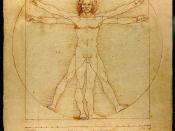The concept of beauty and what it is or is not beautiful is a much debated and complex subject. Many different philosophers and psychologists over hundreds of years have devoted a great deal of time to understanding what makes something beautifully appealing and why. The approach I decided to look at was how is beauty truly perceived is it really in the eye of the beholder or is it part of an evolutionary process that occurs without knowing. To then move on to how the concept of was important in the past and still is just as important in our society today. Also the extreme measures some individual go to, to meet the unrealistic ideals of super-model like appearances and beyond. Finally do we pay to much attention to what is categorized as beautiful as a western society or has media and advertising pushed it to far.
The great philosopher Plato wrote of a system of measuring perfect proportions which was called the "golden proportions", in which, amongst other things, the width of the ideal would be two-thirds it length, while a nose would be no longer than the distance between the eyes.
A concept the Artists of the Renaissance a period of re-birth and re-newel of ideas from the Greek-Roman time. Not only was the influence of such philosophers as Plato seen in art it was displayed through the upper-class society of the time. The concept of idealisation refers to 'perfection' in both form and the physical environment. Plato established the belief that everything had a 'perfect form' in the mind of God. So therefore artists of the Renaissance tried to create the most ideal space using the Golden section technique and stability within their compositions. In both society and art, restraint was a key Renaissance ideal. A multitalented,


